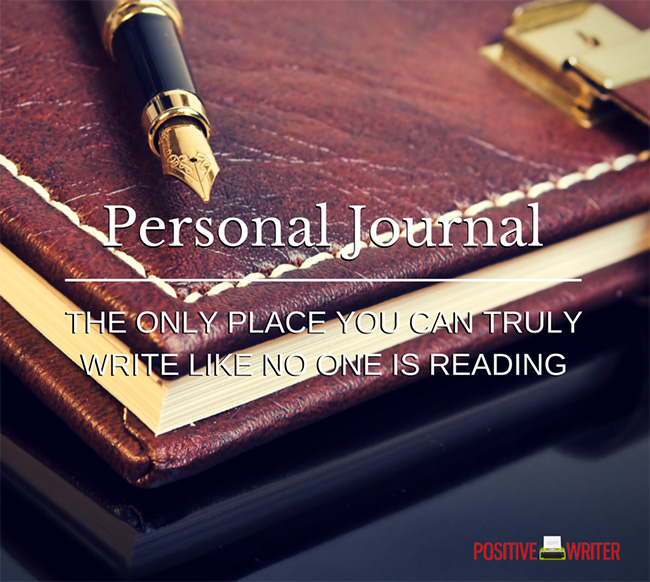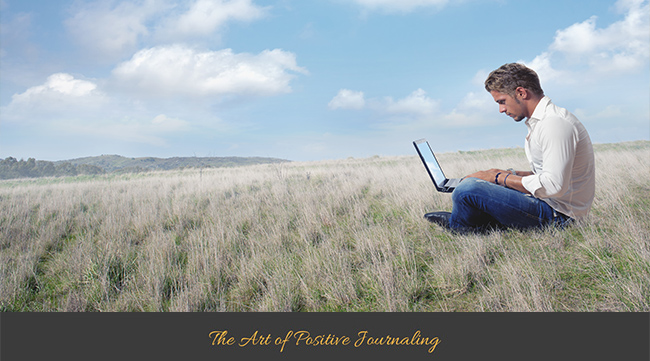Note: This is a post by Positive Writer contributor, Andy Mort of SheepDressedLikeWolves.com
You already know the amazing benefits, so why is it still so hard to keep a journal?

It became my annual tradition as a child, to buy a page-per-day journal in time for January 1st. The intention was the same each New Year: to fill 365 pages with notes, doodles, and reflections.
“I’m going to really stick with it this time”, I would reassure myself every December. But by January 10th the enthusiasm invariably waned. A missed day would turn into a blank week, and then an empty month. Until December rolled back around and I had the chance to re-commit once more.
Most of us are aware that keeping a daily journal is a good thing. We know that it can bring great benefits to our lives (e.g. the provision of an outlet to process one’s brain and the presence of a box of matches to spark into existence new creative ideas).
Knowing is not enough.
You don’t need telling that exercise and good nutrition will enhance the quality and longevity of your life. And yet if you’re like me then you will still make choices that sabotage those things.
So what DOES it take to adopt the positive habit of journalling?
Let me start by saying that even if you’ve struggled to find consistency there is good news…keep persisting and the breakthrough will eventually come. It took me four years of actively trying to finally get there.
I gave up trying when I was a teenager. But in 2012 I started again. From then until the end of 2015 I made slow but significant progress.
In 2016 everything slotted into place and I only missed eight days through the whole year. It’s become a habit so baked into my daily functioning that I don’t even think about it. It’s survived upheaval, moving house, holidays, and periods of extreme stress and busyness.
What changed?

The first step I took was to let go of my dream of keeping a physical paper journal. Yes, I know… heretical, right? With a heavy heart, I had to admit to myself that the romantic ideal of a bulging leather-bound diary was actually a reason I had never successfully kept one.
So I installed Day One on my computer, which is a very simple journalling app that syncs across devices.
The Where and When
I had an established morning habit that meant I didn’t need to reinvent the wheel. I would already wake up, grab a cup of coffee, and get back into bed to write, process emails, and get distracted by social media.
I just needed to change one habit and open the journal app instead of the web browser. Still, this was perhaps unsurprisingly easier said than done.
Make the Right Thing the Easy Thing
It took time to develop a consistency. There were days when I would be getting ready for work and realize, despite my best intentions (and having my laptop open) I had completely forgotten to journal.
Needless distractions had trumped my best intentions.
I started closing down everything on my computer the night before, except the journal app. It became the first thing I would see in the morning when I opened it.
The Chain
Jerry Seinfeld famously talked about how he remains productive writing jokes. He used a big wall calendar and marked off each day he wrote a joke with a big red X. After a few days a chain emerged, as did the desire to keep that chain going.
This is a concept that resonates with me. But it’s also the very reason I failed so often in keeping my journal going when I was younger. The chain was too easily broken because my perfectionistic expectation was too high. A missed day became a gaping hole; an everlasting reminder of failure.
My digital journal, on the other hand, has removed the gaps. There is no page to fill (or miss). This had a surprising impact on my own psychology of perseverance.
You Don’t Need Convincing
Most of us are already intrinsically aware of the many benefits of a personal journal practice.
It’s reminded me of things I would have otherwise forgotten. I’ve untangled thoughts and identified and began to understand anxieties and fears. And it’s been a spark for new songs and creative projects.
Rather than setting hard rules about it (which often lead me to quit), I like to focus on some gentle permissions.
The Permission to Keep it Simple:
I have no objectives or expectations. The only task is to write something. Sometimes I’ll spend 1 minute, sometimes I’ll get immersed for an hour or two. I don’t format the fonts or spend time making things look nice.
The Permission to Stop Thinking:
The words that come out don’t have to make sense. I’m not communicating; I’m processing and releasing. There are times when I hear myself thinking “I better edit this to make it sound better”. Why? “because my future self might think I’m an idiot otherwise”. Seriously, I’m worried about being judged by me. No way! I don’t edit and I don’t look back while I’m writing. Just press onwards.
The Permission to Keep a Secret:
It can feel like nothing is sacred nowadays. People seem to share anything and everything. There are even people who only DO things so they can show or tell people they’re doing it on social media. The personal journal does not carry that motive. It’s a sacred space. A sanctuary, untainted and unblemished by the demands and expectations of others. It’s where I’m completely real with myself so that I can begin to untangle the mysteries of my mind in my own way.
The Permission to Slow Down:
A journal can feel like just another thing to fit into an already busy life. We might be told that we SHOULD do it because it’s what successful people do. This is not healthy thinking because it’s driven by a desire for a quick fix. It will be a catalyst for long term blossoming in ways you cannot predict.
We interrupt this great post to announce that “The Art of Positive Journaling” IS OPEN!! Woot. This is a great course for any writer, or anyone really, who wants to find their voice and write their story. Or maybe you want to find a new way to start a daily writing habit.
The time to sign up and join is limited until the end of August, so go do that here as soon as you’ve finished this article.
The Permission to Write Like No One is Reading:
When I started my blog in 2009 I attracted approximately one reader a month. Probably my mum. It felt a bit disheartening to think that no one was reading.
I will never forget the benefits of having no readers.
Looking back it was kind of cool because it provided the opportunity to explore without pressure. I could write anything because no one was reading. I was free to stretch myself and explore things that caught my attention. Ironically it was this freedom that resulted in people being drawn to it.
When we think people are watching, reading, or listening, there is a temptation to compromise our work.
If I’d started with thousands of readers then I’d have been very aware of that and would have written differently. I might have even stopped writing altogether under the paralyzing impact of fear (disappointing people or making mistakes).
Not so with a journal. No one is reading, so you can write whatever the hell you want.
My journal has become the heart of different aspects of life. My creativity, my relationships, my mindset at work, and my ability to deal and cope with the hardships I face. And whenever I’m feeling curious I have a peek through some of my old posts. I’m consistently amazed by what I read and discover.
Maybe you know you want to journal but can’t get consistent…
Simplify the process to suit you. Even if it takes you four years like me. Just don’t give up.
If you really want to get the most out of journaling, consider joining Bryan’s new course The Art of Positive Journaling. It can make all the difference.
There’s nothing like a little self-investment to compel us to do something worthwhile for ourselves.
